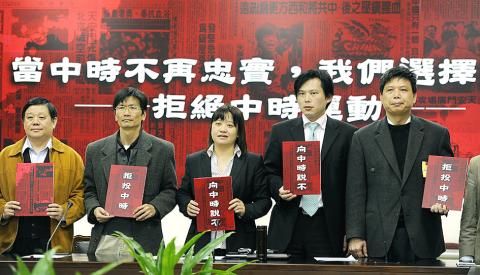More than 60 academics and members of civic groups launched a petition yesterday to boycott the Chinese-language China Times newspaper over recent controversial remarks by its owner, Tsai Eng-meng (蔡衍明), concerning the 1989 Tiananmen Square massacre.
Tsai, chairman and chief executive of the Want Want Group (旺旺集團) and owner of multiple media outlets including the China Times, said in an interview last month with the Washington Post that the 1989 crackdown on June 4 in Beijing did not constitute a massacre.
A joint petition drafted by academics and civic groups, including the Taipei Society and pro-democracy advocates, yesterday called for a “boycott of the crooked China Times.”

Photo: George Tsorng, Taipei Times
Petitioners called on the public to reject such an “unfaithful medium,” accusing the China Times of abandoning its responsibilities as a media outlet and allowing itself to become a tool for Tsai to ingratiate himself with a totalitarian regime.
Taipei Society director Huang Kuo-chang (黃國昌) appealed for more academics to join their efforts to blacklist the China Times, adding that they might petition government agencies in the near future.
National Chengchi University’s Department of Radio and Television associate professor Kuo Li-shin (郭力昕) said Tsai’s remarks had damaged the professionalism, autonomy and freedom of journalism.
Kuo also called on columnists perceived as pan-blue to back the boycott by “not writing or publishing” in the China Times in a bid to heal a split within society that divides people into either pan-blue or pan-green camps.
“This is just the first step,” Kuo said, adding that Tsai’s constant attempts to acquire and merge different media outlets have monopolized the supposedly diversified public voices of Taiwanese society.
Chiou Wen-tsong (邱文聰), an assistant researcher at Academia Sinica, expressed concern over how little attention the media have paid to Tsai’s remarks, describing the phenomenon as “the gradual collapse of Taiwan’s defense mechanism for its democracy.”
With the owner of a media outlet being in total control of its editorial line and monitoring what its reporters can put in their -articles, it appears as if Taiwanese are under the control of a totalitarian regime again, National Chengchi University professor Ku Chung-hwa (顧忠華) said.
Wang Dan (王丹), a student leader in Tiananmen Square in 1989 who initiated the boycott against the China Times last month via a post on his Facebook page, yesterday wrote on his Facebook page: “In my opinion, people are entitled to express their stance on historic incidents and to defend their freedom of speech in their own manner. It’s not necessary to force columnists currently working at the China Times to quit writing because of public pressure. So long as they can ensure that their articles are not altered or removed, we should respect their choices.”
Meanwhile, according to a reporter working at the China Times, employees scarcely talked about the controversy triggered by Tsai, adding that Tsai’s remarks and the China Times’ pro-China stance had caused jeering among his co-workers.
“We are only trying to make a living,” the anonymous reporter said, adding that Tsai, who last week said his remarks had been distorted and taken out of -context by the Washington Post and that he would communicate with people who misunderstood him, should keep his word and clearly explain his remarks.
Translated by Stacy Hsu, Staff Writer

SECURITY: As China is ‘reshaping’ Hong Kong’s population, Taiwan must raise the eligibility threshold for applications from Hong Kongers, Chiu Chui-cheng said When Hong Kong and Macau citizens apply for residency in Taiwan, it would be under a new category that includes a “national security observation period,” Mainland Affairs Council (MAC) Minister Chiu Chui-cheng (邱垂正) said yesterday. President William Lai (賴清德) on March 13 announced 17 strategies to counter China’s aggression toward Taiwan, including incorporating national security considerations into the review process for residency applications from Hong Kong and Macau citizens. The situation in Hong Kong is constantly changing, Chiu said to media yesterday on the sidelines of the Taipei Technology Run hosted by the Taipei Neihu Technology Park Development Association. With

CARROT AND STICK: While unrelenting in its military threats, China attracted nearly 40,000 Taiwanese to over 400 business events last year Nearly 40,000 Taiwanese last year joined industry events in China, such as conferences and trade fairs, supported by the Chinese government, a study showed yesterday, as Beijing ramps up a charm offensive toward Taipei alongside military pressure. China has long taken a carrot-and-stick approach to Taiwan, threatening it with the prospect of military action while reaching out to those it believes are amenable to Beijing’s point of view. Taiwanese security officials are wary of what they see as Beijing’s influence campaigns to sway public opinion after Taipei and Beijing gradually resumed travel links halted by the COVID-19 pandemic, but the scale of

A US Marine Corps regiment equipped with Naval Strike Missiles (NSM) is set to participate in the upcoming Balikatan 25 exercise in the Luzon Strait, marking the system’s first-ever deployment in the Philippines. US and Philippine officials have separately confirmed that the Navy Marine Expeditionary Ship Interdiction System (NMESIS) — the mobile launch platform for the Naval Strike Missile — would take part in the joint exercise. The missiles are being deployed to “a strategic first island chain chokepoint” in the waters between Taiwan proper and the Philippines, US-based Naval News reported. “The Luzon Strait and Bashi Channel represent a critical access

Pope Francis is be laid to rest on Saturday after lying in state for three days in St Peter’s Basilica, where the faithful are expected to flock to pay their respects to history’s first Latin American pontiff. The cardinals met yesterday in the Vatican’s synod hall to chart the next steps before a conclave begins to choose Francis’ successor, as condolences poured in from around the world. According to current norms, the conclave must begin between May 5 and 10. The cardinals set the funeral for Saturday at 10am in St Peter’s Square, to be celebrated by the dean of the College